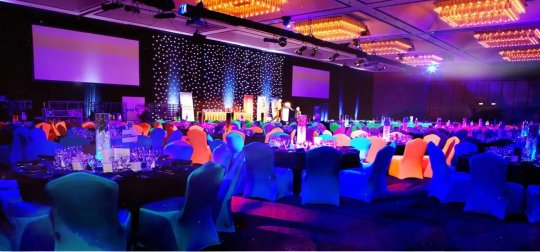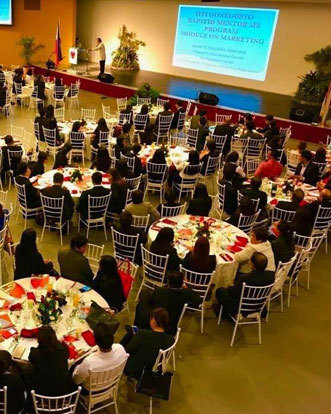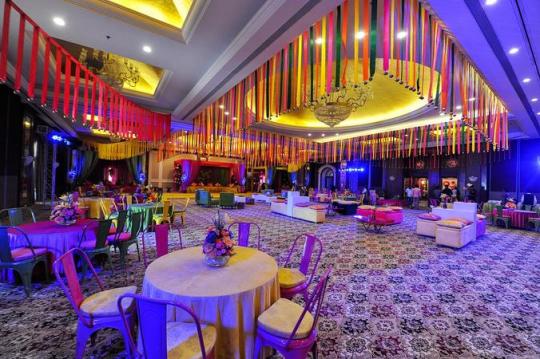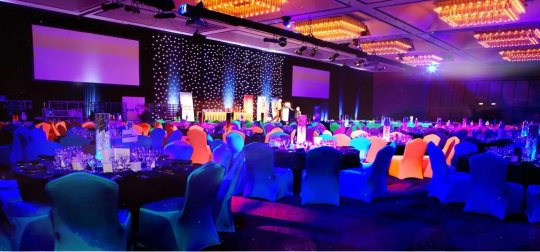Don't wanna be here? Send us removal request.
Text
The Top 5 Advantages of 3D Visualization in Corporate Events
The ability to visualize an event space and design concepts before they come to life can be a game-changer. 3D visualization technology has revolutionized how event planning companies approach the intricate process of organizing and executing events. By offering a realistic and immersive preview, 3D visualization provides numerous advantages that enhance the planning and execution stages, ensuring successful and memorable corporate events. Here are the top five benefits of incorporating 3D visualization in corporate events.

0 notes
Text
The Importance of Conducting a Venue Recce with a Corporate Event Producer
In the realm of corporate event management, the choice of venue is often the cornerstone of a successful event. A well-selected venue not only sets the tone but also significantly influences the logistical planning and overall execution. To ensure that the chosen venue aligns perfectly with the event’s goals and requirements, conducting a thorough venue recce (reconnaissance) with an event producer is crucial. This practice offers several benefits, ensuring that the event runs smoothly and leaves a lasting impression on attendees.

0 notes
Text
5 Key Steps to Plan an Awards Event in Abu Dhabi
Planning an awards event in Abu Dhabi involves meticulous attention to detail and a structured approach to ensure success. This vibrant city, known for its luxurious venues and rich cultural heritage, provides an excellent backdrop for an unforgettable event. To navigate the complexities of organizing such an event, in this article we share the five key steps to follow, with insights on how an experienced event organizer in Abu Dhabi can make a significant difference.

0 notes
Text
5 Cool Brand Activation Ideas for Technology Product Launch in Dubai
Dubai is known for its spectacular skyline and cutting-edge architecture, making it the perfect backdrop for a high-tech projection mapping show. Collaborate with a brand activation agency in Dubai to design a visually stunning projection that showcases your new technology product in a unique and captivating way.

0 notes
Text
The Importance of Conducting a Venue Recce with a Corporate Event Producer
In the realm of corporate event management, the choice of venue is often the cornerstone of a successful event. A well-selected venue not only sets the tone but also significantly influences the logistical planning and overall execution. To ensure that the chosen venue aligns perfectly with the event’s goals and requirements, conducting a thorough venue recce (reconnaissance) with an event producer is crucial. This practice offers several benefits, ensuring that the event runs smoothly and leaves a lasting impression on attendees. In this blog, we give you the primary reasons why an event venue recce is indispensable in event management.

1. Accurate Assessment of Space and Layout
A venue recce allows the event producer to gain a firsthand understanding of the available space and layout. While floor plans and photographs provide a general idea, they often lack the detail needed for precise planning. During a site visit, the event producer can measure spaces, visualize the flow of the event, and determine how different areas can be utilized effectively.
This accurate assessment is vital for planning seating arrangements, stage setups, and exhibition spaces. It ensures that the venue can accommodate all planned activities without feeling cramped or disjointed. Additionally, understanding the layout helps in optimizing the placement of essential elements such as entrances, exits, registration desks, and catering stations.
2. Identifying Potential Challenges and Solutions
Every venue has its unique set of challenges, whether it’s limited access points, acoustics issues, or restrictive load-in/load-out procedures. An on-site recce allows the event producer to identify these potential obstacles early in the planning process. Recognizing these challenges in advance provides the opportunity to develop effective solutions, ensuring that the event runs smoothly on the day.
For example, if the venue has limited parking space, the event producer can arrange for additional parking or shuttle services. If there are acoustic challenges, they can plan for additional sound equipment or strategically place soundproofing elements. By addressing these issues beforehand, the event producer ensures a seamless experience for all attendees.
3. Ensuring Technical Feasibility
Corporate events often involve sophisticated technical setups, including audio-visual equipment, lighting, and internet connectivity. Conducting a venue recce with an event producer ensures that the venue’s technical capabilities are fully understood and compatible with the event’s requirements. This includes assessing power sources, connectivity options, and the availability of technical support on-site.
An event producer will also test the venue’s acoustics and lighting conditions, ensuring that presentations, performances, and other activities are delivered effectively. This proactive approach helps avoid technical glitches during the event, maintaining a professional and polished atmosphere.
4. Coordinating Logistics and Vendor Management
A venue recce is essential for effective logistics planning and vendor management. The event producer can coordinate with venue staff, understand their policies, and establish a working relationship. This collaboration is crucial for seamless communication and coordination on the event day.
Additionally, the recce provides an opportunity to evaluate the venue’s loading docks, storage areas, and back-of-house facilities. Understanding these logistics helps in planning the movement of equipment, decor, and other materials. The corporate event managementproducer can also ensure that vendors such as caterers, decorators, and technical teams have the necessary access and facilities to set up efficiently.
5. Enhancing the Attendee Experience
Ultimately, the success of a corporate event hinges on the attendee experience. A venue recce allows the event producer to envision the event from the attendee’s perspective, ensuring that all aspects are designed to enhance comfort, convenience, and engagement. This includes evaluating the accessibility of the venue, the quality of amenities, and the overall ambiance.
For example, the event producer can assess the comfort and suitability of seating arrangements, the visibility from various points in the room, and the ease of navigation around the venue. They can also plan for additional signage, attendee assistance points, and other elements that contribute to a positive experience.
6. Verifying Compliance and Safety Standards
Ensuring compliance with safety standards and regulations is a critical aspect of corporate event management. A venue recce allows the event producer to verify that the venue meets all necessary safety requirements, including fire exits, emergency procedures, and accessibility standards.
This verification process includes inspecting the condition of facilities, ensuring that emergency exits are clearly marked, and confirming that the venue has adequate safety measures in place. The event producer can also plan for any additional safety requirements, such as first aid stations or security personnel, to ensure the well-being of all attendees.
Conclusion
For planning any event, conducting a venue recce with an event producer is a fundamental practice that ensures the success of the event. This thorough on-site evaluation provides invaluable insights into the venue’s capabilities, potential challenges, and logistical considerations. By addressing these factors proactively, event producers can create meticulously planned events that run smoothly and deliver exceptional experiences.
From accurate space assessment and technical feasibility to enhanced attendee experience and safety compliance, the benefits of a venue recce are far-reaching. For corporate event management professionals, this practice is not just an option but a necessity. It forms the bedrock of effective planning and execution, ensuring that every event is a memorable success.
#corporate event management#corporate event management agency#event management dubai#event organizer company
0 notes
Text
The Top 5 Advantages of 3D Visualization in Corporate Events
The ability to visualize an event space and design concepts before they come to life can be a game-changer. 3D visualization technology has revolutionized how event planning companies approach the intricate process of organizing and executing events. By offering a realistic and immersive preview, 3D visualization provides numerous advantages that enhance the planning and execution stages, ensuring successful and memorable corporate events. Here are the top five benefits of incorporating 3D visualization in corporate events.

1. Enhanced Conceptualization and Planning
One of the primary advantages of 3D visualization is its ability to bring concepts to life during the planning phase. Traditional methods rely heavily on 2D sketches and verbal descriptions, which can sometimes lead to misunderstandings or misaligned expectations. With 3D visualization, event planning companies can create detailed, realistic models of the event space, allowing stakeholders to see exactly how the event will look and feel.
This enhanced conceptualization aids in better decision-making, as clients can visualize seating arrangements, stage designs, lighting setups, and other critical elements. By providing a comprehensive preview, 3D visualization ensures that all parties have a clear and unified vision, reducing the likelihood of last-minute changes and miscommunications.
2. Improved Communication and Collaboration
Effective communication is crucial for the success of any corporate event. 3D visualization acts as a powerful communication tool that bridges the gap between event planners and their clients. It allows for a more interactive and engaging dialogue, as clients can provide immediate feedback on the visualized design and layout.
Additionally, 3D models can be shared with various stakeholders, including venue managers, decorators, and technical teams, ensuring everyone is on the same page. This collaborative approach not only streamlines the planning process but also fosters a sense of involvement and ownership among all parties, leading to a more cohesive and well-executed event.
3. Cost Efficiency and Risk Reduction
Budget management is a critical aspect of corporate event planning, and 3D visualization contributes significantly to cost efficiency. By providing a detailed and accurate preview of the event, it helps identify potential issues and areas for improvement early in the planning process. This foresight allows event planning companies to make necessary adjustments before any resources are committed, reducing the risk of costly errors and last-minute changes.
Moreover, 3D visualization can help in planning the logistics more effectively. For instance, it can simulate the flow of attendees, ensuring that the layout facilitates smooth movement and minimizes congestion. This proactive approach not only enhances the attendee experience but also mitigates potential risks related to crowd management and safety.
4. Marketing and Presentation Advantages
In the competitive field of event planning, the ability to impress clients and stakeholders from the outset is invaluable. 3D visualization serves as a compelling marketing tool that event planning companies can use to showcase their creativity and expertise. High-quality 3D renders and virtual walkthroughs provide a wow factor that can significantly enhance presentations and proposals.
For clients, seeing a lifelike representation of their event can instill confidence and excitement. It demonstrates the planner’s capability to deliver a polished and professional event, increasing the likelihood of securing contracts and building long-term client relationships. Additionally, these visual assets can be used in promotional materials, social media campaigns, and event websites to generate buzz and attract attendees.
5. Real-Time Modifications and Flexibility
One of the standout benefits of 3D visualization is the ability to make real-time modifications. Event planning often involves numerous revisions and adjustments based on client feedback and evolving requirements. With traditional planning methods, these changes can be time-consuming and cumbersome. However, 3D visualization software allows planners to quickly and easily make changes to the design and layout, providing immediate visual feedback.
This flexibility is particularly valuable during client meetings and presentations. Event planning companies can instantly show the impact of different design choices, such as altering the color scheme, changing furniture arrangements, or modifying lighting effects. This dynamic approach not only saves time but also enhances client satisfaction by ensuring their vision is accurately realized.
Conclusion
The integration of 3D visualization in corporate event planning offers transformative benefits that significantly enhance the planning and execution processes. By improving conceptualization, facilitating better communication, increasing cost efficiency, providing marketing advantages, and offering real-time flexibility, 3D visualization empowers event planning companies to deliver exceptional events that meet and exceed client expectations.
In a competitive industry where the margin for error is slim, the ability to visualize and refine every detail before the event day is a crucial advantage. As technology continues to advance, the role of 3D visualization in event planning will only become more prominent, setting a new standard for how corporate events are designed and executed. For event planning companies looking to stay ahead of the curve, embracing 3D visualization is not just an option—it’s a necessity.
#Event planning companies#event management company#event company dubai#corporate event management#event organizer company
0 notes
Text
The Transformative Power of Physical Live Events
In an era where digital interactions have become the norm, the value of physical live events cannot be overstated. These gatherings, orchestrated with precision by an experienced event company, offer unique benefits that virtual events simply cannot replicate. From fostering genuine connections to creating memorable experiences, live events hold a distinctive charm and effectiveness that make them indispensable in various contexts. In this blog, we talk about the benefits of organizing a physical live event.

1. Authentic Networking Opportunities
One of the most significant advantages of physical live events is the unparalleled networking opportunities they present. In-person interactions foster a level of authenticity and rapport that is difficult to achieve through a screen. Attendees can engage in spontaneous conversations, exchange business cards, and build relationships that often lead to fruitful collaborations. For professionals, this face-to-face interaction is crucial for trust-building and establishing long-lasting business connections.
An event company plays a crucial role in facilitating these networking opportunities by designing the event layout strategically. From networking lounges to interactive workshops, the setting is curated to encourage dialogue and engagement among participants.
2. Enhanced Engagement and Focus
Physical live events command a level of engagement and focus that is often lacking in virtual settings. Attendees at a live event are immersed in the experience, free from the distractions of their home or office environments. This immersion leads to better attention, higher participation rates, and a more impactful event overall.
Event companies understand the importance of maintaining attendee engagement and employ various techniques to achieve this. Interactive sessions, live demonstrations, and breakout discussions are just a few examples of how they keep the audience actively involved.
3. Memorable Experiences and Emotional Impact
The sensory experiences provided by physical live events create lasting memories and emotional connections. From the ambiance of the venue to the live performances and the tangible materials, every element contributes to a multi-sensory experience that resonates with attendees.
An adept event producer knows how to harness these sensory elements to craft an unforgettable experience. They use lighting, sound, décor, and even scent to evoke emotions and create a vibrant atmosphere that leaves a lasting impression.
4. Direct Feedback and Real-Time Interaction
Live events offer the advantage of immediate feedback and interaction. Speakers and organizers can gauge the audience's reactions in real-time, allowing them to adjust their presentations or address concerns on the spot. This dynamic interaction is invaluable for understanding the audience's needs and preferences.Event companies often include Q&A sessions, live polls, and feedback forms as part of the event structure to facilitate this two-way communication. These elements ensure that the event remains responsive and relevant to the audience.
5. Brand Exposure and Promotion
For businesses, physical live events are a powerful platform for brand exposure and promotion. They provide a space to showcase products, services, and innovations directly to a targeted audience. The physical presence of a brand at an event often translates to a stronger and more tangible brand recall. Working with an experiencedevent companyhelps you maximize brand visibility by strategically placing logos, banners, and promotional materials throughout the venue. They also coordinate sponsorship opportunities and branded experiences that align with the event’s theme and objectives.
6. Building Community and Fostering Loyalty
Live events are instrumental in building a sense of community and fostering loyalty among attendees. The shared experience of attending an event creates a bond among participants, who often become advocates for the event and the organizing brand.Event companies leverage this by creating inclusive and engaging environments where attendees feel valued and connected. Through social activities, group discussions, and collaborative sessions, they nurture a community spirit that extends beyond the event itself.
7. Learning and Development Opportunities
Physical live events are fertile ground for learning and professional development. Workshops, seminars, and keynote speeches provide attendees with valuable knowledge and skills that can be applied in their personal and professional lives. The opportunity to interact directly with experts and industry leaders adds immense value to the learning experience.Event companies ensure that the educational content is delivered effectively by selecting qualified speakers, organizing well-structured sessions, and providing high-quality materials. This commitment to excellence enhances the overall educational impact of the event.
8. Boosting Local Economies
Hosting physical live events can have a positive impact on the local economy. Attendees often spend money on travel, accommodation, food, and entertainment, benefiting local businesses and contributing to economic growth. An event company plays a pivotal role in this economic boost by choosing venues that can accommodate a large number of participants and by collaborating with local vendors and service providers. Their efforts ensure that the event not only benefits the attendees but also the broader community.
In Conclusion
The benefits of physical live events are manifold and far-reaching. From fostering genuine connections and engagement to creating memorable experiences and boosting local economies, these events hold a unique and irreplaceable value. An experienced event company is essential in orchestrating these benefits, ensuring that every aspect of the event is meticulously planned and executed. As we navigate an increasingly digital world, the power of in-person interactions and the irreplaceable value of physical live event remains more relevant than ever.
0 notes
Text
10 Must Haves in a Corporate Event Planning Calendar
Planning a corporate event can be a daunting task, but with the right approach and detailed planning, it can be a seamless and successful experience. Event planning companies understand that a comprehensive event plan calendar is essential for orchestrating a flawless event. Read ten must-haves in a corporate event plan calendar in this blog to ensure your event runs smoothly from start to finish.

0 notes
Text
Benefits of Working with a Sports Management Company
A sports management company brings a wealth of expertise and experience to the table. These companies specialize in organizing sports events, understanding the unique challenges and opportunities in the industry. Their extensive knowledge of logistics, event marketing, sponsorship acquisition, and athlete management ensures that every aspect of your event is handled professionally. An experienced event organizer company, for example, can leverage local insights and connections to navigate the city’s dynamic event landscape effectively.

0 notes
Text
How to Design a Successful Corporate Technology Event in Dubai
Designing a successful corporate technology event requires a unique blend of creativity, technical expertise, and strategic planning. Top event management companies in Dubai, known for their excellence and cutting-edge approach, provide invaluable insights into crafting remarkable technology events. In this blog, you get a detailed guide on corporate event design for technology events, inspired by the best practices from leading event planners in Dubai.

0 notes
Text
How to Run a Hybrid Event in Dubai in 2024
The first step in planning a hybrid event is to clearly define your objectives and understand your audience. Identify the goals of the event, whether it’s to educate, entertain, or network. Understanding the audience’s preferences will help in designing a seamless experience for both in-person and virtual attendees. An experienced event management company can assist in conducting market research to gain insights into your target demographic.

0 notes
Text
The Power of Live Streaming for Large-Scale Events
Live streaming has emerged as a game-changer for large-scale events. It expands the reach, enhances engagement, and offers a dynamic way to interact with audiences. For event organisers in Dubai, leveraging live streaming can elevate the impact and accessibility of their events. This blog delves into the benefits, strategies, and best practices of live streaming for large-scale events.

0 notes
Text
The Power of Live Streaming for Large-Scale Events
Live streaming has emerged as a game-changer for large-scale events. It expands the reach, enhances engagement, and offers a dynamic way to interact with audiences. For event organisers in Dubai, leveraging live streaming can elevate the impact and accessibility of their events. This blog delves into the benefits, strategies, and best practices of live streaming for large-scale events.

Expanding Reach
One of the most significant advantages of live streaming is its ability to transcend geographical boundaries. For large-scale events in Dubai, which often attract a global audience, live streaming ensures that those who cannot attend in person can still participate virtually. This not only amplifies the event's reach but also increases its overall visibility and impact. By streaming events live, organisers can engage a wider audience, from local attendees to international viewers, maximizing the event's footprint.
Enhancing Engagement
Live streaming offers numerous interactive features that can significantly boost audience engagement. Event organisers in Dubai can leverage live chats, Q&A sessions, polls, and social media integration to create a more interactive experience. These features allow virtual attendees to participate actively, making them feel as much a part of the event as those on-site. Engaged audiences are more likely to share their experiences, further amplifying the event's reach and impact.
Effectiveness and Accessibility
Hosting large-scale events can be expensive, especially in a city like Dubai where high standards are the norm. Live streaming provides a cost-effective alternative to accommodating large numbers of in-person attendees. It reduces logistical costs related to venue capacity, travel, and accommodation while making the event more accessible to a broader audience. This inclusivity is particularly important in the current climate, where travel restrictions and health concerns can limit physical attendance.
Real-Time Analytics
One of the advantages of digital events is the ability to track and analyze viewer behavior in real-time. Live streaming platforms offer detailed analytics, including the number of viewers, their locations, engagement levels, and more. Event managers use this data to understand audience preferences, measure the success of their content, and make informed decisions for future events. Real-time feedback also allows for on-the-fly adjustments to improve the viewer experience.
Monetization
Live streaming opens up various monetization avenues that can benefit event organisers. These include pay-per-view options, subscription models, and sponsorship opportunities. By offering exclusive content, behind-the-scenes access, or premium packages, organisers can create additional revenue streams. For example, Dubai's high-profile events can attract significant sponsorship deals, leveraging the extensive online reach that live streaming provides.
Enhanced Brand Exposure
For brands and sponsors, live streaming offers unparalleled exposure opportunities. Branded content, sponsored segments, and digital advertisements can reach a vast online audience, providing excellent ROI for sponsors. Event organisers in Dubai capitalize on this by integrating brand partnerships seamlessly into the live stream, offering value to both sponsors and viewers. This enhanced exposure helps build stronger relationships with sponsors and adds value to the event.
Building a Virtual Community
Live streaming helps build a virtual community around an event. By engaging audiences online, event organisers can foster a sense of community and connection among participants. This is particularly beneficial for recurring events, as it helps maintain engagement year-round. Dubai's event organisers use live streaming to cultivate a loyal following, ensuring that their events remain top-of-mind for audiences.
Content Repurposing
The content generated from live streaming can be repurposed in various ways to extend its lifespan and value. Recorded sessions can be edited and shared as on-demand content, highlights can be used for marketing, and key moments can be featured on social media. This not only maximizes the content's utility but also keeps the event's momentum going long after it has concluded.
Technical Best Practices
To ensure a successful live streaming experience, it’s crucial to address technical considerations. Reliable internet connectivity, high-quality audio and video equipment, and a user-friendly platform are essential. Plan for potential technical issues, with backup systems and support teams in place. Testing the live stream thoroughly before the event can help identify and resolve any problems, ensuring a smooth viewing experience for the audience.
Promoting the Live Stream
Promotion is key to attracting viewers to the live stream. Effective strategies include social media marketing, email campaigns, and collaborations with influencers. Start promoting well in advance, highlighting the event’s key attractions and what viewers can expect. Engaging trailers, sneak peeks, and countdowns can generate excitement and drive audience interest.
Live streaming is revolutionizing the way large-scale events are conducted, offering numerous benefits from expanded reach to enhanced engagement and monetization opportunities. For event organisers in Dubai, incorporating live streaming into their event strategy is not just a trend but a necessity in today's digital age. By leveraging the power of live streaming, they can create memorable, impactful, and widely accessible events that resonate with a global audience.
0 notes
Text
How to Design a Successful Corporate Technology Event in Dubai
Designing a successful corporate technology event requires a unique blend of creativity, technical expertise, and strategic planning. Top event management companies in Dubai, known for their excellence and cutting-edge approach, provide invaluable insights into crafting remarkable technology events. In this blog, you get a detailed guide on corporate event design for technology events, inspired by the best practices from leading event planners in Dubai.

1. Understanding the Event’s Purpose and Audience
The first step in designing a technology event is to clearly define its purpose and understand the target audience. Whether it's a product launch, a tech conference, or an industry expo, knowing the event's goals helps shape its overall design. Experts emphasize the importance of audience demographics, interests, and expectations. This understanding informs every aspect of the event, from the choice of speakers to the type of activities and presentations.
2. Innovative Venue Selection
Dubai boasts a plethora of state-of-the-art venues suitable for technology events. Selecting a venue that complements the event’s theme is crucial. High-tech venues equipped with the latest audiovisual technology, ample networking spaces, and modern amenities are ideal. The top event management companies in Dubai often recommend venues which offers expansive space and advanced facilities perfect for tech events like Coca-cola Arena, Dubai World Trade Centre or ExpoCity.
3. Cutting-Edge Technology Integration
Technology events should naturally incorporate the latest technological advancements. This can range from interactive displays and augmented reality (AR) experiences to virtual reality (VR) demonstrations and AI-driven engagement tools. Implementing advanced tech solutions not only enhances the attendee experience but also showcases the event as a leader in innovation.
4. Engaging Content and Programming
The success of a technology event heavily relies on its content and programming. Focus on curating a compelling agenda that includes keynote speeches, panel discussions, workshops, and live demonstrations. Featuring industry leaders and innovators as speakers can draw significant attention and add credibility to the event. Additionally, incorporating breakout sessions and interactive workshops can engage attendees and provide valuable learning opportunities.
5. Personalized Attendee Experience
Creating a personalized experience for attendees can significantly enhance their engagement and satisfaction. Utilizing data-driven approaches to tailor content, recommendations, and networking opportunities can make attendees feel valued. For instance, event apps that provide personalized schedules, suggest relevant sessions, and facilitate connections based on interests are highly effective. Top event management companies in Dubai leverage such tools to ensure a memorable attendee experience.
6. Sustainable Event Practices
Sustainability is becoming increasingly important in event planning. Incorporating eco-friendly practices such as digital ticketing, recyclable materials, and energy-efficient setups can reduce the event's environmental footprint. Dubai companies are pioneers in adopting green event solutions, aligning with global sustainability trends and enhancing the event's appeal to environmentally conscious attendees.
7. Effective Marketing and Promotion
A robust marketing strategy is essential to generate buzz and attract the right audience. Utilizing a mix of traditional and digital marketing channels, including social media, email campaigns, press releases, and influencer partnerships, can maximize reach. Event companies in Dubai excel in creating comprehensive marketing plans that highlight the event's unique selling points and drive attendance.
8. Seamless On-Site Management
On-site management is critical to the smooth execution of the event. This includes efficient registration processes, real-time assistance, and effective crowd control measures. Employing trained staff and utilizing technology like RFID badges and mobile check-ins can streamline operations. Experienced event managers ensure flawless on-site management, providing a professional and hassle-free experience for all attendees.
9. Engaging Networking Opportunities
Networking is a key component of any technology event. Designing dedicated networking zones, scheduling networking breaks, and organizing facilitated networking activities can encourage meaningful interactions among attendees. Innovative approaches such as matchmaking apps and networking lounges equipped with interactive screens can enhance the networking experience.
10. Post-Event Evaluation and Follow-Up
The final step in successful event design is post-event evaluation and follow-up. Gathering feedback from attendees through surveys and analyzing event data helps identify strengths and areas for improvement. Additionally, sending personalized thank-you notes, sharing event highlights, and providing access to recorded sessions can extend the event's impact. Top event management companies in Dubai prioritize comprehensive post-event analysis to continually refine their strategies and deliver exceptional future events.
Conclusion
Designing a corporate technology event requires meticulous planning, innovative thinking, and a deep understanding of the target audience. Companies must set a high standard by incorporating these best practices to create a technology event that not only meets but exceeds expectations, leaving a lasting impression on all attendees.
0 notes
Text
10 Must Haves in a Corporate Event Planning Calendar
Planning a corporate event can be a daunting task, but with the right approach and detailed planning, it can be a seamless and successful experience. Event planning companies understand that a comprehensive event plan calendar is essential for orchestrating a flawless event. Read ten must-haves in a corporate event plan calendar in this blog to ensure your event runs smoothly from start to finish.

1. Clear Objectives and Goals
Before diving into the logistics, it’s crucial to outline the objectives and goals of the event. Whether it's a product launch, a team-building retreat, or an annual conference, having clear objectives helps steer all planning activities. This foundational step ensures that every aspect of the event is aligned with the desired outcomes, providing a focused direction for the planning process.
2. Budget Planning and Allocation
Budgeting is a cornerstone of event planning. Event planning companies emphasize the importance of setting a realistic budget that includes all potential expenses, such as venue rental, catering, entertainment, marketing, and unexpected costs. A well-structured budget ensures financial control and helps in making informed decisions throughout the planning stages.
3. Venue Selection and Booking
Choosing the right venue is pivotal to the success of a corporate event. Factors like location, capacity, amenities, and accessibility play a significant role in venue selection. It is recommended to book the venue well in advance to secure the best options and rates. Include site visits and contract negotiations in your calendar to avoid last-minute surprises.
4. Timeline and Milestones
An event plan calendar should include a detailed timeline with key milestones. Break down the planning process into manageable phases, such as pre-event planning, event execution, and post-event wrap-up. Setting specific deadlines for tasks like sending out invitations, finalizing the agenda, and confirming vendors helps keep the planning process on track.
5. Marketing and Promotion
A robust marketing and promotion strategy is essential to attract attendees and generate buzz around the event. This includes creating a marketing plan that outlines the use of social media, email campaigns, press releases, and other promotional activities. Companies should start promotional efforts early and maintain consistent communication to keep the audience engaged.
6. Vendor Coordination
Collaborating with reliable vendors is critical for the smooth execution of an event. This includes caterers, audio-visual providers, decorators, and transportation services. Ensure that your calendar includes meetings and deadlines for contracting, confirming, and coordinating with all vendors. Regular check-ins help prevent miscommunication and ensure that all parties are aligned.
7. Attendee Management
Managing attendee registration and communication is another crucial aspect of corporate event planning. Implementing a streamlined registration system, whether through an online platform or manual process, is essential. Keep track of RSVPs, dietary restrictions, and special requirements. Regularly update your calendar with deadlines for sending out reminders and follow-up communications.
8. Logistics and On-Site Management
Detailing the logistics is key to ensuring the event day runs smoothly. This includes arranging transportation, setting up the venue, managing technical equipment, and coordinating with staff and volunteers. Event planning companies often use detailed checklists and run-throughs to ensure all logistics are covered. Schedule a dry run or rehearsal in your calendar to iron out any potential issues.
9. Contingency Planning
Despite meticulous planning, unforeseen circumstances can arise. Having a contingency plan in place is a must. This involves identifying potential risks and developing backup plans, such as alternative venues, backup vendors, and emergency procedures. Include regular risk assessment reviews in your event plan calendar to stay prepared for any eventuality.
10. Post-Event Evaluation
The work doesn’t end when the event is over. Post-event evaluation is critical for understanding what went well and identifying areas for improvement. Schedule debrief meetings with your team and stakeholders, gather feedback from attendees, and analyze the event’s overall performance against the set objectives. This step is invaluable for planning future events and ensuring continuous improvement.
Creating a detailed and structured event plan calendar is essential for the success of any corporate event. By incorporating these ten must-haves, companies can ensure a well-organized and efficient planning process in coordination with event planning companies. From setting clear objectives and budgeting to post-event evaluation, every step plays a vital role in the seamless execution of a corporate event.
0 notes
Text
10 Must Haves in a Corporate Event Planning Calendar
Planning a corporate event can be a daunting task, but with the right approach and detailed planning, it can be a seamless and successful experience. Event planning companies understand that a comprehensive event plan calendar is essential for orchestrating a flawless event. Read ten must-haves in a corporate event plan calendar in this blog to ensure your event runs smoothly from start to finish.

1. Clear Objectives and Goals
Before diving into the logistics, it’s crucial to outline the objectives and goals of the event. Whether it's a product launch, a team-building retreat, or an annual conference, having clear objectives helps steer all planning activities. This foundational step ensures that every aspect of the event is aligned with the desired outcomes, providing a focused direction for the planning process.
2. Budget Planning and Allocation
Budgeting is a cornerstone of event planning. Event planning companies emphasize the importance of setting a realistic budget that includes all potential expenses, such as venue rental, catering, entertainment, marketing, and unexpected costs. A well-structured budget ensures financial control and helps in making informed decisions throughout the planning stages.
3. Venue Selection and Booking
Choosing the right venue is pivotal to the success of a corporate event. Factors like location, capacity, amenities, and accessibility play a significant role in venue selection. It is recommended to book the venue well in advance to secure the best options and rates. Include site visits and contract negotiations in your calendar to avoid last-minute surprises.
4. Timeline and Milestones
An event plan calendar should include a detailed timeline with key milestones. Break down the planning process into manageable phases, such as pre-event planning, event execution, and post-event wrap-up. Setting specific deadlines for tasks like sending out invitations, finalizing the agenda, and confirming vendors helps keep the planning process on track.
5. Marketing and Promotion
A robust marketing and promotion strategy is essential to attract attendees and generate buzz around the event. This includes creating a marketing plan that outlines the use of social media, email campaigns, press releases, and other promotional activities. Companies should start promotional efforts early and maintain consistent communication to keep the audience engaged.
6. Vendor Coordination
Collaborating with reliable vendors is critical for the smooth execution of an event. This includes caterers, audio-visual providers, decorators, and transportation services. Ensure that your calendar includes meetings and deadlines for contracting, confirming, and coordinating with all vendors. Regular check-ins help prevent miscommunication and ensure that all parties are aligned.
7. Attendee Management
Managing attendee registration and communication is another crucial aspect of corporate event planning. Implementing a streamlined registration system, whether through an online platform or manual process, is essential. Keep track of RSVPs, dietary restrictions, and special requirements. Regularly update your calendar with deadlines for sending out reminders and follow-up communications.
8. Logistics and On-Site Management
Detailing the logistics is key to ensuring the event day runs smoothly. This includes arranging transportation, setting up the venue, managing technical equipment, and coordinating with staff and volunteers. Event planning companies often use detailed checklists and run-throughs to ensure all logistics are covered. Schedule a dry run or rehearsal in your calendar to iron out any potential issues.
9. Contingency Planning
Despite meticulous planning, unforeseen circumstances can arise. Having a contingency plan in place is a must. This involves identifying potential risks and developing backup plans, such as alternative venues, backup vendors, and emergency procedures. Include regular risk assessment reviews in your event plan calendar to stay prepared for any eventuality.
10. Post-Event Evaluation
The work doesn’t end when the event is over. Post-event evaluation is critical for understanding what went well and identifying areas for improvement. Schedule debrief meetings with your team and stakeholders, gather feedback from attendees, and analyze the event’s overall performance against the set objectives. This step is invaluable for planning future events and ensuring continuous improvement.
Creating a detailed and structured event plan calendar is essential for the success of any corporate event. By incorporating these ten must-haves, companies can ensure a well-organized and efficient planning process in coordination with event planning companies. From setting clear objectives and budgeting to post-event evaluation, every step plays a vital role in the seamless execution of a corporate event.
0 notes
Text
Unveiling the Grandeur: Event Management in Dubai
Experience seamless event execution with Mosaic Live, the leading event management Dubai company. From corporate gatherings to extravagant celebrations, we blend creativity, precision, and passion to craft unforgettable experiences. Trust Mosaic Live to turn your vision into reality, leaving a lasting impression on your guests. Let's create moments that matter together.

0 notes